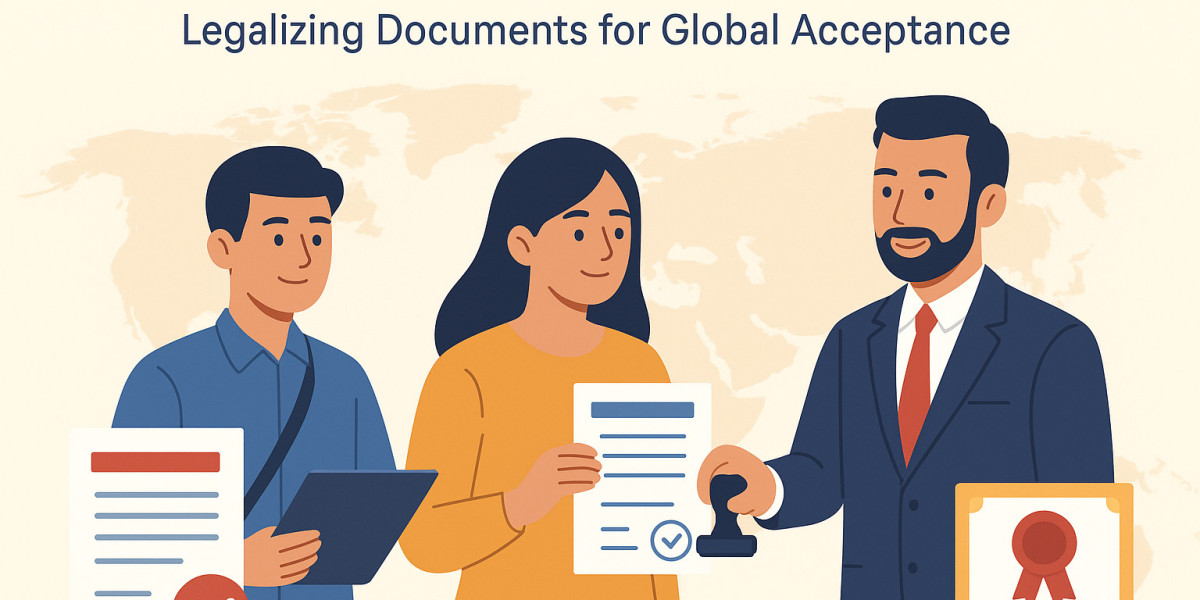In an increasingly interconnected world, migration across borders has become a common part of modern life. Whether for higher education, employment, business, or settlement, people frequently move abroad to explore opportunities. However, crossing international boundaries is not merely about obtaining a visa; it requires a range of legal procedures to establish the authenticity of an individual’s identity and credentials. Among these,Indian certificate attestation plays a crucial role. For Indian citizens seeking to study, work, or live overseas, the attestation of certificates is mandatory for legal recognition in foreign countries. It is the process that validates educational, personal, and commercial documents, transforming them into globally accepted legal papers.
Understanding Certificate Attestation
Certificate attestation is a process where documents issued in India are verified by designated authorities to confirm their authenticity. This procedure ensures that foreign governments and institutions can trust the documents presented by Indian nationals. Simply put, attestation is a bridge of trust between the issuing country (India) and the receiving country. Without attestation, even genuine certificates may be considered invalid abroad.
The procedure involves multiple steps, starting from local verification to state authentication, then central government approval, and sometimes, embassy or consulate endorsement. Each step adds a layer of trust to the document. For example, if an Indian student applies to a university in the United Arab Emirates (UAE), the university will not accept the degree certificate unless it has been duly attested by Indian authorities and legalized by the UAE embassy.
Why is Certificate Attestation Important?
The necessity of attestation stems from the global need for standardization, security, and trust. Countries want to ensure that individuals entering their borders bring authentic documents, especially in cases involving employment or education. Below are key reasons why attestation holds significance:
Verification of Authenticity – Attestation confirms that the certificate is genuine and has not been forged or tampered with.
Legal Requirement – Most countries mandate attestation before issuing visas, work permits, or residence permits.
Employment Purposes – Employers abroad rely on attested educational certificates to verify qualifications.
Higher Education – Universities and colleges abroad require attested mark sheets and degrees before admission.
Family and Personal Reasons – Attested marriage or birth certificates are necessary for family visas or sponsorship.
Business Expansion – For Indian companies establishing branches abroad, attested commercial documents like incorporation certificates are mandatory.
Without attestation, individuals may face rejection of applications, delays in visa processing, or even denial of entry into a foreign country.
Categories of Certificates That Require Attestation
Not all documents are treated the same way. Broadly, certificates fall into three categories, each requiring a different approach to attestation.
1. Educational Certificates
These include academic documents such as:
Degree certificates
Diplomas
Mark sheets
School leaving certificates
Educational certificate attestation is essential for students planning to pursue higher education abroad, professionals seeking employment, or skilled workers applying for work visas.
2. Personal Certificates
Personal documents establish an individual’s identity and civil status. Examples include:
Birth certificates
Marriage certificates
Divorce decrees
Death certificates
Medical reports
These are commonly required for family visa applications, child admission to schools abroad, or dependent visa sponsorship.
3. Commercial Certificates
Businesses also require attestation when they operate globally. Common commercial documents include:
Memorandum of Association (MOA)
Articles of Association (AOA)
Partnership agreements
Power of attorney
Export licenses and invoices
Commercial certificate attestation is crucial for Indian companies intending to expand internationally or engage in trade partnerships.
The Step-by-Step Process of Indian Certificate Attestation
The attestation process involves multiple authorities, both Indian and foreign. While the sequence may vary depending on the type of document and destination country, the general procedure is as follows:
Step 1: Notary Attestation
The process begins at the local level. Certificates are first attested by a notary public in India to confirm the authenticity of the document.
Step 2: State Level Attestation
For educational certificates, the State Education Department verifies the document. For personal documents, the Home Department or General Administration Department (GAD) of the respective state performs the verification.
Step 3: MEA Attestation
The Ministry of External Affairs (MEA), Government of India, authenticates the documents after state-level verification. MEA attestation confirms that the documents are genuine at the national level.
Step 4: Embassy/Consulate Attestation
If the destination country requires further legalization, the respective foreign embassy or consulate in India will attest the documents. This ensures that the receiving country acknowledges the authenticity.
Step 5: MOFA Attestation (Destination Country)
In some cases, upon arrival in the foreign country, the Ministry of Foreign Affairs (MOFA) of that country may conduct a final attestation to complete the process.
This layered verification ensures that documents are universally trusted, reducing the risk of fraud or misuse.
Countries That Commonly Require Indian Certificate Attestation
While certificate attestation is globally recognized, it is particularly crucial for countries in the Middle East and Asia. Nations such as the United Arab Emirates (UAE), Saudi Arabia, Qatar, Kuwait, Oman, and Bahrain strictly require attestation for employment and residence purposes. Similarly, countries like Singapore, Malaysia, and certain European nations also request legalized documents. The exact requirements depend on bilateral agreements between India and the destination country.
Attestation vs. Apostille: What’s the Difference?
Many people confuse attestation with apostille. While both serve the purpose of document legalization, they are distinct processes.
Attestation involves multiple verifications and is generally required by countries not part of the Hague Convention of 1961.
Apostille is a simplified form of legalization, valid among the 125+ countries that are members of the Hague Convention. India is a member, and thus, for countries under the Convention, only MEA apostille is required instead of embassy attestation.
For instance, if an Indian wishes to work in France (a Hague member country), an apostille suffices. But for Saudi Arabia (not a member), attestation by both MEA and the Saudi embassy is mandatory.
Challenges Faced in Certificate Attestation
While the process appears straightforward in theory, individuals often encounter practical challenges.
Time-Consuming Process – Multiple stages of verification can take weeks or even months.
Lack of Awareness – Many applicants are unaware of the specific requirements of their destination country.
Fraudulent Agents – Unregulated middlemen sometimes exploit individuals by overcharging or mishandling documents.
Regional Variations – Different states in India may have slightly different procedures, causing confusion.
Strict Embassy Rules – Some embassies have stringent verification norms, making the process more complex.
Role of Professional Attestation Services
Given the complexity, many individuals and businesses turn to professional attestation agencies. These agencies streamline the process, handle paperwork, and liaise with authorities. Their expertise reduces errors, saves time, and minimizes stress for applicants. However, it is essential to choose authorized and reputed service providers to avoid fraud.
The Legal Framework Behind Attestation
Certificate attestation is not just an administrative practice but is backed by laws and international agreements. In India, the MEA governs the authentication of documents, operating under guidelines aligned with global diplomatic protocols. Similarly, foreign embassies follow international conventions on legalizing documents to ensure uniformity. This legal framework strengthens the credibility of the attestation process, making it a globally accepted practice.
The Human Impact of Certificate Attestation
Beyond legalities, certificate attestation touches the lives of millions of Indians in profound ways. A young graduate dreams of studying in the United States; a professional seeks a better future in the Gulf; a family reunites abroad—all of these journeys begin with attestation. It may seem like a bureaucratic hurdle, but in reality, it acts as the first step toward fulfilling life-changing aspirations.
Digital Transformation in Attestation Services
With India’s rapid digitalization, certificate attestation is also evolving. Online application portals, e-verification, and digital MEA services are being introduced to reduce delays and improve transparency. The government’s move toward e-governance ensures faster processing while minimizing the role of fraudulent agents. In the near future, blockchain and AI-based verification could revolutionize how global institutions authenticate documents.
Tips for a Smooth Attestation Process
Start Early – Begin the attestation process well in advance of travel plans.
Understand Requirements – Research the specific requirements of your destination country.
Use Authorized Agencies – Always choose licensed attestation service providers.
Keep Originals and Copies – Ensure all original documents and multiple photocopies are ready.
Track Progress – Use official portals to monitor the progress of your application.
Conclusion
Indian certificate attestation is more than a bureaucratic formality—it is the passport of your documents into the global arena. It safeguards trust, ensures compliance with international laws, and enables individuals and businesses to access opportunities abroad. While the process may appear time-consuming, it is a necessary step in an interconnected world where authenticity and trust are paramount.
As globalization continues, the role of certificate attestation will only grow in significance. For every Indian student, professional, or entrepreneur aiming to go global, attestation is not just paperwork; it is the first step toward realizing dreams on a worldwide stage. By embracing this process with awareness, preparation, and support from reliable services, Indians can ensure that their documents speak the language of trust and acceptance across borders.



